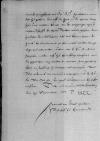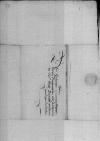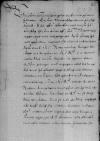Ewer[1] Er(barkei)t bedenckenn, / was unnser zwkunfftig zwsame komen uff sant Michels thag[2] anghet, / hatt unns nach gelegenheit dieser ferlich(en) zeit woll gefhallenn. / Vorgleicht sich auch mit anderer herrn ⌊dieser lannde ko(nigliche)n rethe⌋ meynung, / derwegen wir solchs mit den erstenn an ⌊ko(niglich)e m(ajeste)t⌋, u(nseren) a(llergnedigsten) herrenn, wollen durch unnser schreyben mit eygenem bottenn lassenn gelangen unnd antzeygenn alles das jennige, das unns zw gedachts thags haldung / aus billichen, nötlichenn ursachenn / hätt gehindert unnd abtzogenn / mit erbiettung, so yre ko(niglich)e m(ajeste)t villeicht den herrn rethenn, / do an gelegenn, / etwas gesint were zw thun ader handlen befelhenn, / das solchs yre m(ajeste)t an sy schrifftlich thet stellenn, / domit sy under in durch bothschafft / ader brieffe, / doruff sich möchtenn berathenn und iwr m(ajeste)t willenn, / so vill muglich, / ins werg bringenn, darnach weytter ire m(ajeste)t berichtenn. / Auch beduncket unns / nebenn etlichenn andern herrenn / zwerhalten im  APG 300, 53, 267, p. 56 ⌊lannde⌋ eynigkheyt / von ⌊ko(nigliche)r m(ajeste)t⌋ zw byttenn / mandat zw gebenn, / das uff die zeyt, so die ⌊herren rethe⌋ zwsame mochten komen, / von der vorgangen axcise rechenschafft den herrn rethen wurdt gethan, / domit zwischen dem loblichenn adel und kleinen steten der zanck des bierbrawens halben mochte werd(en) hingelegt, / und alle andere sachen, / wie E(wer) Er(barkei)t in irem schreyben melden, / uff zw khunfftige ⌊thagfart⌋, / wan die gehalthen mag werd(en), / den parthen irer gerechtigkheit unschedlich / zuvorlegen und vorweysen. / Was wir widerumb vor anntwurt erlangenn, / sol E(wer) Er(barkei)t, die wir Gott in sein gnad befelhenn, / mit den ersten wissenn.
APG 300, 53, 267, p. 56 ⌊lannde⌋ eynigkheyt / von ⌊ko(nigliche)r m(ajeste)t⌋ zw byttenn / mandat zw gebenn, / das uff die zeyt, so die ⌊herren rethe⌋ zwsame mochten komen, / von der vorgangen axcise rechenschafft den herrn rethen wurdt gethan, / domit zwischen dem loblichenn adel und kleinen steten der zanck des bierbrawens halben mochte werd(en) hingelegt, / und alle andere sachen, / wie E(wer) Er(barkei)t in irem schreyben melden, / uff zw khunfftige ⌊thagfart⌋, / wan die gehalthen mag werd(en), / den parthen irer gerechtigkheit unschedlich / zuvorlegen und vorweysen. / Was wir widerumb vor anntwurt erlangenn, / sol E(wer) Er(barkei)t, die wir Gott in sein gnad befelhenn, / mit den ersten wissenn.
 APG 300, 53, 267, p. 56
APG 300, 53, 267, p. 56 

